Congressman Henry Cuellar (D-TX-28) and Congresswoman Kay Granger (R-TX-12), as well as U.S. Ambassador to Costa Rica S. Fitzgerald Haney and Costa Rican Ambassador to the United States Román Macaya, traveled last week to the Costa Rican border with Nicaragua to see firsthand how Central America is dealing with a recent surge of Cuban migrants who are trying to make it to the United States by land, mostly through Texas.
During their visit, Congressman Cuellar, Congresswoman Granger and Ambassador Haney visited migrant shelters in Peñas Blancas and La Cruz, Costa Rica, at the border with Nicaragua, where as many as 8,000 Cuban migrants have been stranded without money or resources since November 15, when Nicaragua shut its borders to Cuban migrants looking to travel through their territory en route to the United States.
Cuban migration to the United States has surged for the past two years, among ongoing talks between the United States and Cuba to restore diplomatic relations. Due to the possibility of normalizing relations between the two countries, many Cubans fear the end of a special immigration policy given to Cuban citizens under the 1966 Cuban Adjustment Act. Under the Cuban Adjustment Act and subsequent policy directives those who reach the United States by land can apply for residency, while those who are interdicted at sea are sent back to their country, this is more commonly known as the “Wet Foot/Dry Foot” policy.
Thousands of Cubans in the past year have flown from their country to Ecuador and traveled by land through Central America before being stranded in Costa Rica since November 15. An agreement for a pilot program was made by Central American countries last week and allows for these migrants to fly from Costa Rica to El Salvador, where they will continue their journey to the U.S. via bus through Guatemala and Mexico.
According to the U.S. Department of Homeland Security, over 43,000 Cuban migrants crossed into the United States in FY 2015, and 28,000 of these migrants, or around two-thirds, have crossed through the Laredo field office on the Texas-Mexico border. That’s more than double the number in FY 14, when over 24,000 Cuban migrants entered the United States, with over 15,000, about two thirds, entering through Laredo.
“As I met with migrants and they were telling me their stories, I asked them where their place of entry into the U.S. will be. Most of them said my hometown of Laredo, Texas,” Congressman Cuellar said. “Many connect to relatives and others in the United States via smart phone applications such as WhatsApp while they are making the journey. Migrants buy new SIM cards in each country they travel through so they can keep connected. “The 1966 Cuban Adjustment Act, also known as the ‘wet foot, dry foot’ policy, is a relic of the Cold War. We should not condone this very dangerous route that many Cubans are taking, as human traffickers can very easily prey on those who are in need. I believe Congress needs to eliminate this outdated policy.”
“I thank Congresswoman Granger, chair of the House State and Foreign Operations Appropriations Subcommittee, and who headed the House Speaker’s Working Group on national security and the humanitarian crisis on the southern border last year, for her continued help on this issue. In a bipartisan manner, Chairwoman Granger and I helped add $750 million in funding to Central America in the omnibus to implement strategies to help reduce illegal immigration to the United States and bolster regional governance, prosperity, and security. We need to continue to help Central America and Costa Rica to address this situation.
I also thank Ambassador Haney and Ambassador Macaya, as well as the representatives and people of Costa Rica, who have shown great compassion in helping these stranded migrants,” Cuellar added.
|
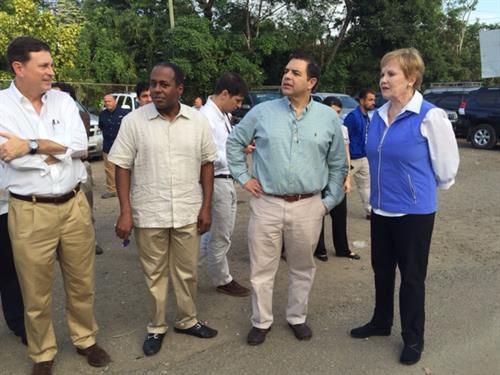
Congressman Cuellar(third from left) meets with (from left to right) Costa Rican Ambassador to the U.S. Román Macaya, U.S. Ambassador to Costa Rica S. Fitzgerald Haney and Congresswoman Kay Granger in Peñas Blancas, Costa Rica on December 29 to discuss the Cuban migration crisis in
Central America.
|
|
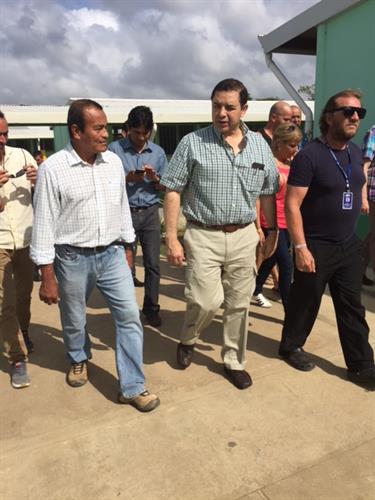
CR31: Congressman Cuellar speaks with Carlos Matías Gonzaga Martínez, mayor of La Cruz, Costa Rica, on the border with Nicagura, regarding the Cuban migration situation. Coincidentally, La Cruz, Costa Rica, is also a sister city with Laredo, Texas.
|
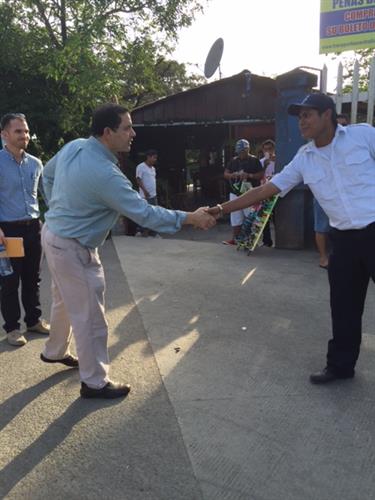
Congressman Cuellar, while on the Costa Rican side of the border, shakes hands with a Nicaraguan migrant official on the Nicaraguan side of the border. |
|
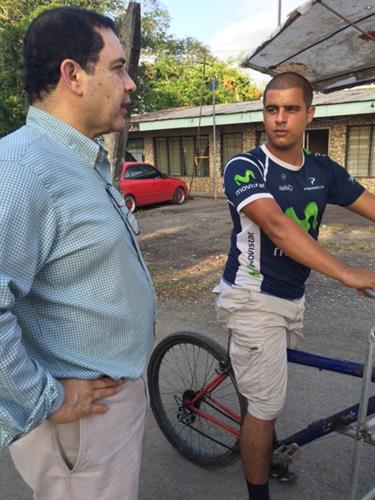
CR28: Congressman Cuellar speaks to a Cuban migrant in Peñas Blancas, Costa Rica on December 29.
|
|
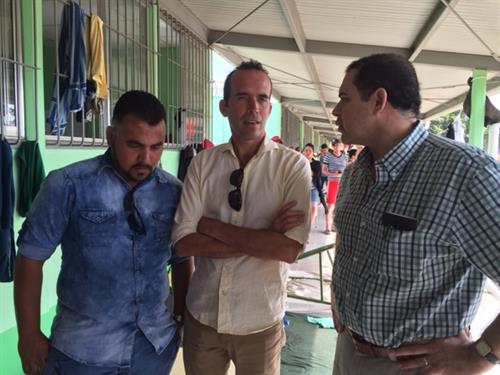
CR19: Congressman Cuellar (right) speaks with two Cuban doctors who are also migrating through Central America to reach the United States by land.
|
|
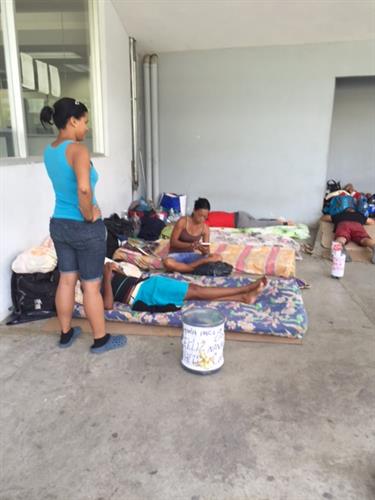
Cuban migrants rest at a local Shelter in Peñas Blancas, Costa Rica. Thousands of migrants have been stranded in Costa Rica without money or resources since November.
|
|
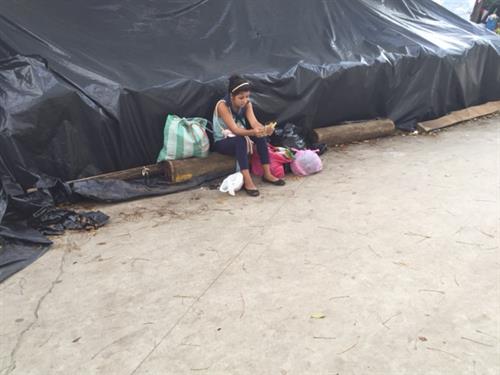
A Cuban migrant at a shelter in Costa Rica counts her money as she rations her resources for the journey to the United States.
|
|
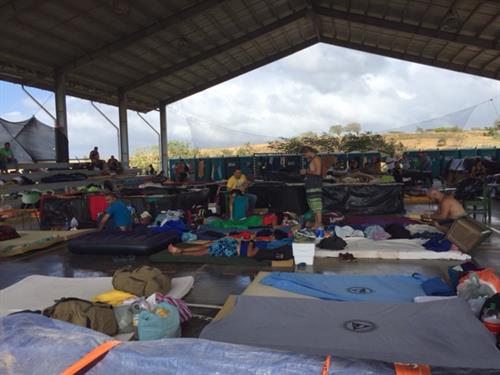
R29: Costa Rican shelters have taken in Cuban migrants who have been stranded in the country on their way to the United States.
|
|
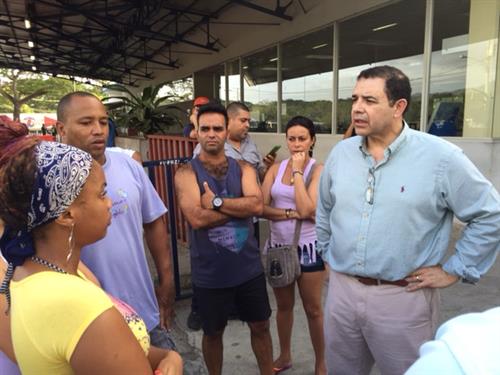
Congressman Cuellar speaks to Cuban migrants in Costa Rica about the risks take and their reasons for making the journey from Cuba to the United States. For many migrants, their destination is Laredo, Texas.
|










